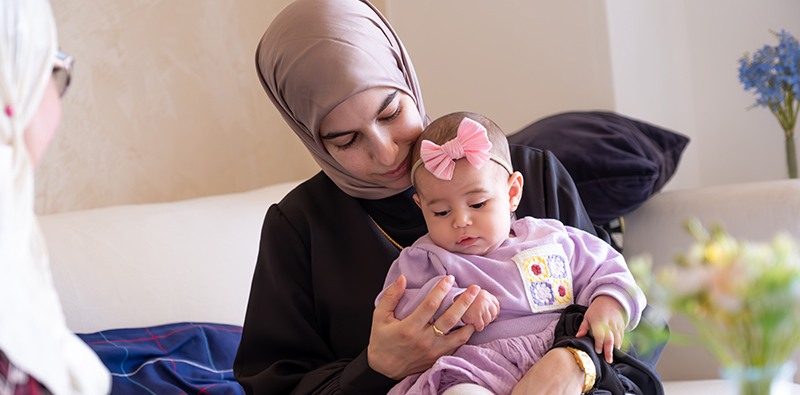
Experts from the University of Nottingham have played a major role in a pioneering national study investigating the postnatal mental health of British South Asian mothers.
The ROSHNI-2 study, which is published today in The Lancet, is one of the most extensive research trials ever conducted to investigate how effective psychological intervention is when providing postnatal support to British South Asian mothers.
The study, funded by the National Institute for Health and Care Research (NIHR), recruited over 4,000 women from all across the UK, proving that effective engagement in research can be done both on a large scale and with a group of people that have been described as ‘hard to reach’.
The research was led by Professor Nusrat Husain from the University of Manchester and Mersey Care, and Farah Lunat, Research Operations Manager at Lancashire and South Cumbria NHS Foundation Trust (LSCft).
Professor Richard Morriss, from the Institute of Mental Health and School of Medicine at the University of Nottingham, and his team, provided the research team with expertise in designing and running multicentre randomised controlled trials in depression.
British South Asian women are statistically more likely to experience mental health issues, however they present to mental health services at a considerably lower rate than White women. Black and Asian minority groups make up 13% of the UK population with British South Asian women as the largest ethnic minority group in the UK. This represents a significant proportion of the population that is currently underserved by mental health services and often not accounted for when recruiting research participants.
The reasons for this are complex and include factors such as family engagement, language barriers, cultural perceptions of mental health and a lack of culturally sensitive services. To help overcome these barriers, the ROSNHI2 study pioneered a culturally adapted model of recruiting, engaging and retaining research its participants.
The study compared a talking treatment for postnatal depression developed specifically for British South Asian women, called the ‘Positive Health Programme’, delivered in a group setting, to usual treatment provided by a GP. The aim was to find out if the group talking treatment worked and if it was value for money.
It was found that more women in the Positive Health Programme group recovered, compared to the treatment-as-usual group. By 12 months, the women in the Positive Health Programme group continued to stay well, but by that time the women in the usual treatment group also recovered. The results are promising, as more women in the Positive Health Programme group recovered both quickly and significantly, and this has implications for developing future care.
These findings have helped researchers and health professionals to better understand how to best engage with British South Asian families. As a result of the study, recommendations have been made to policy makers in health care, specifically around the availability of culturally sensitive treatment options for British South Asian women who experience postnatal depression.
Professor Morriss, who is also the NIHR Applied Research Collaboration (ARC) East Midlands Theme Lead for Mental Health and Well-being, said: “Previously British South Asian women have been under-represented in mental health services for pregnant women and their families run by the NHS across the Midlands and across the United Kingdom. We helped a team that led by the ROSHNI -D trial team from North West England to adapt the way that British South Asian were provided help for post-natal depression including the psychological treatment they were given.
“Groups of British South Asian women attended psychological treatment given in English and a South Asian language. We recruited women for the study from British South Asian communities in Derby and Leicester along with five other sites in the United Kingdom.
“More than 700 women were recruited with benefits on the mother’s depression, their day to day function and their parenting skills. Hopefully these cultural adaptations might be considered for the British South Asian community in the future so that more women from South Asian communities might benefit.”